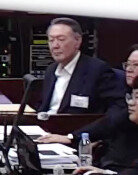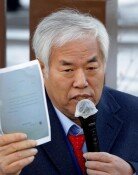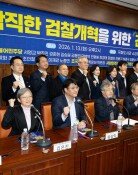[Editorial] 18th National Assembly Mustnt Repeat Mistakes
[Editorial] 18th National Assembly Mustnt Repeat Mistakes
Posted May. 30, 2008 08:29,
The four-year term of the 18th National Assembly kicks off today in the absence of politics. As the new National Assembly opens almost simultaneously with the launch of the Lee Myung-bak administration, the most democratic and efficient parliament in history of Korean politics may emerge, if the ruling and opposition parties seek win-win politics. However, that will be unlikely to happen in reality. The ruling and opposition parties have been sharply divided over the Agriculture Ministrys promulgation of the sanitary terms on U.S. beef imports. Even though rising oil prices are hitting hard on low-income earners and piles of laws and systems are waiting to be revised to help the nation join the ranks of advanced countries, no political parties are taking initiatives to fix these problems.
Oppositional parties, including the main opposition United Democratic Party (UDP), declared to take the protest outside the National Assembly building.
Politics is all about coordinating diverse public opinions through dialogue and negotiations, and this is the very reason that the National Assembly exists. Staging protests outside the parliament is simply no different from destroying the public sphere and denying the reason for the existence of the National Assembly. Political parties, which should serve as communication channels and stop street politics, are rather encouraging people to participate in rallies.
The ruling Grand National Party is the majority party in the 18th National Assembly with 153 o121ut of 299 seats. The main opposition UDP has 81 seats. The total number of lawmakers from conservative parties, including the Pro-Park Alliance and the Liberty Forward Party, reaches almost 200. If the parliament were to run under normal circumstances, it would make efforts to help the government manage state affairs more stably. However, many political analysts predict that the conservative forces will constantly face opposition from unreasonably grumbling minor parties, considering that this has usually been the case and the political reality of Korea.
The GNP must not fall into the temptation of exploiting its power preponderance. Although the new power structure was built by the peoples votes, it is important to note that politics always involves more than one partys dominance. Democracy is based on majority rule, but dialogue and compromises are also inseparable parts of it. The GNP should always listen to the voices of the opposition parties and respect them as its partners to manage state affairs. If necessary, the GNP should make a compromise or persuade them. The opposition parties should also change. If they try to make up for their lack of lawmakers by asking for the impossible, politics will disappear and the National Assembly will plunge into a chaos.
Former National Assembly Speaker Kim Won-ki, who has wrapped up his 30-year political journey, said, I hope the oppositional parties will declare that they will not physically obstruct the proceedings and the governing party will avow that it will sincerely negotiate with the oppositional parties until the end. Lim Chae-jung, who finished his term as National Assembly speaker yesterday, said, The highest principle in the National Assembly is respecting majority voices. The ruling party should listen carefully to the opposition parties and embrace them, while the oppositional parties should become the peoples reliable representatives who suggest alternatives or turn the publics desires into policies. Both the ruling and opposition parties 299 lawmakers of the 18th National Assembly should always keep these critical remarks in their hearts.
The 18th National Assembly should not repeat the mistakes of the 17th National Assembly. The now-defunct governing Uri Party secured the foundation to achieve political stability with a majority of 152 seats in the last parliament, but they constantly created a lot of noise and disputes because they bulldozed four radical reform bills from the beginning. Because of this, the livelihood of the people was ignored, negotiations between parties were disappeared, and the National Assembly was thrown into disorder. Chains and electric saws were used to open the door of the National Assembly Hall in which lawmakers staged a protest. It was embarrassing to call it the hall of public opinion. The 17th National Assembly submitted three times as many bills as the 16th National Assembly. However, the percentage of bills passed at the 17th National Assembly was lower than that of the 16th National Assembly. The 18th National Assembly should normalize politics so that it can contribute to improving national competiveness and make Korea become an advanced nation in the near future. In order to do so, the foremost task of the new National Assembly will be the ratification of the Free Trade Agreement with the United States. Time is running out. Both the ruling and oppositional parties should immediately work on the necessary procedures for its ratification as soon as the negotiations for the formation of the parliament committees are complete.



![[속보]국힘 윤리위, 한동훈 제명 결정…장동혁호 ‘뺄셈 정치’ 가나](https://dimg.donga.com/c/138/175/90/1/wps/NEWS/IMAGE/2026/01/14/133151701.1.jpg)



